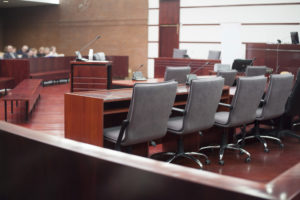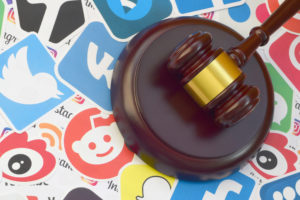In some jurisdictions, if a “reasonable person” can’t determine whether a social media account is a “joke” or “real,” the person responsible for making the account can be successfully sued for defamation. Which raises a question: As the “meta-fication” of humor becomes more prevalent, will plaintiffs start winning more Twitter parody defamation lawsuits?
Twitter Parody Defamation Lawsuit Going Down In Michigan
A Twitter parody defamation lawsuit is currently underway in Michigan. Todd Levitt, a former faculty member at Central Michigan University (CMU), is suing Zachary Felton, a CMU senior who created a faux Twitter account under Levitt’s name.
About The Two Parties: Teacher v. Student
According to Vice.com, Todd Levitt could fairly be described as:
“a self-promoting bro’s bro who sings karaoke in college bars, who films himself nodding along to “Bad to the Bone” in his car, and who loved it when a website compared him to Saul Goodman, the sleazy lawyer character on Breaking Bad. (Ummm, Saul Goodman WAS a great character…so…..)
But according to Levitt, his detractors are just jealous haters. And he may be right, as students fight for seats in his CMU classes.
Competing opinions on Levitt’s personality mean nothing to us in this case, because applicable law is (or, at least, should be) blind to such subjective factors. But Levitt’s case is interesting to us, in that it could further shape parody defamation case law as it relates to social media.
Professor / Lawyer / Aspiring Reality Show Star Files Defamation Lawsuit Over Twitter Parody Account
Unamused by Felton’s Twitter mockery, Levitt filed a lawsuit claiming false light, intentional infliction of emotional distress, libel, tortious interference with business relations, business defamation and unfair competition. The filing mentions $25,000 of alleged actual harm caused by Felton’s parody Twitter account.
Defense Attorney Says Plaintiff Arrived With “Unclean Hands”

Upon notice of Levitt’s claim, Felton’s attorneys fired back, arguing that the case is frivolous because Levitt “[came] to the court with unclean hands.” The defense lawyers also accuse Levitt of:
- Intimidating witnesses;
- Creating a phony award to promote himself; and
- Purposefully misstating material fact.
Plaintiff Declared “Public Figure” in Twitter Parody Lawsuit
There is still a question as to whether or not Levitt will be considered a “public figure” for the purposes of this case. If he is, he’ll have to meet a higher level of proof to win. Why? Because under United States law, in order to mitigate “censorship-by-way-of-defamation-lawsuit,” so-called “famous” libel plaintiffs must prove that the defendant knowingly lied with the intent to cause harm.
It’s Not Just About The Twitter Account, Apparently
When asked about his upcoming day in court, Levitt said he’s looking forward to it and thinks he’ll be able to “expose” behind-the-scenes hornswoggle at CMU’s college of business administration “from the top down.”
Speak With A Lawyer Who Has Handled Twitter Parody Defamation Cases
Is a Twitter parody or social media satire causing you problems? If yes, get in touch with Kelly / Warner Law today. We are a top-rated Internet libel law firm. The statute of limitations for defamation is short – so, don’t wait too long. Get in touch today to begin the conversation.Yes! I Want To Speak With A Lawyer About Twitter Parody »





Leave a Reply
Your email is safe with us.